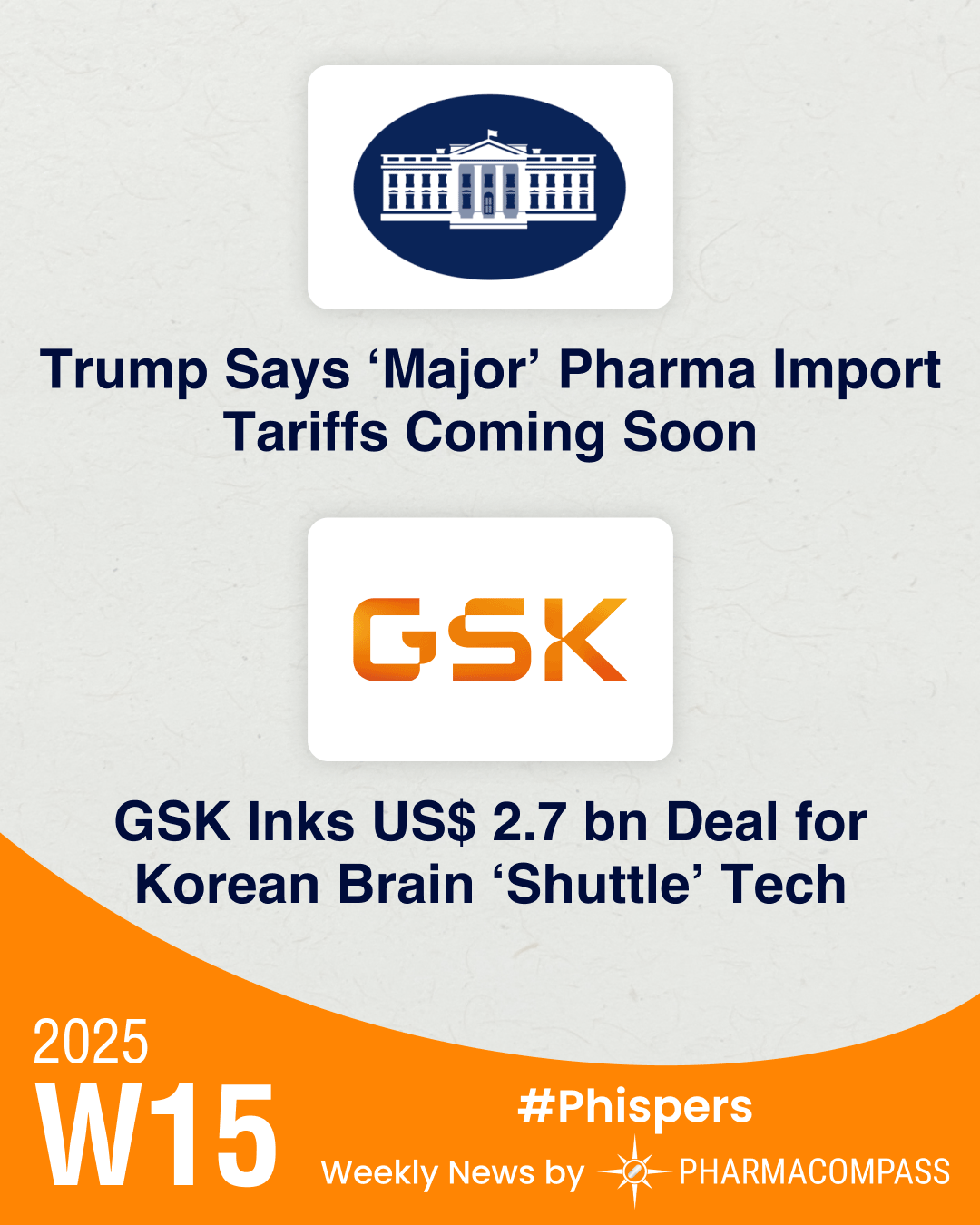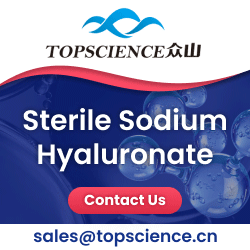
By PharmaCompass
2025-04-10
Impressions: 815 (Article) || 12 (Video)
In this week’s news, US President Donald Trump has said “major” pharmaceutical import tariffs are coming soon. In Europe, biopharma CEOs warned European Commission President von der Leyen that these proposed tariffs could potentially spark a pharma exodus from the EU to the US, estimated at over US$ 100 billion.
Mass layoffs at the US Food and Drug Administration (FDA) have removed critical review staff, jeopardizing user fee programs and threatening to delay new medicine approvals.
GSK secured a US$ 2.66 billion deal with South Korea’s ABL Bio for the innovative brain “shuttle” technology aimed at developing treatments for neurodegenerative diseases. In a similar deal, Eli Lilly paid cash-strapped Sangamo Therapeutics US$ 1.4 billion to gain access to its proprietary neurotropic adeno-associated virus (AAV) capsid, STAC-BBB, that targets five neurological diseases.
Amgen’s Uplizna made history as the FDA’s first approved treatment for the rare IgG4-related disease. Meanwhile, the agency rejected Aldeyra’s dry eye treatment reproxalap for the second time. In trials, Rhythm Pharmaceuticals’ Imcivree achieved impressive results in treating rare obesity in a late stage trial.
And, in a stunning reversal, the US Secretary of Health and Human Services Robert F. Kennedy Jr., an anti-vaccine leader, has acknowledged the MMR vaccine as the “most effective way” to prevent measles.
Trump talks of pharma tariffs; ‘US$ 100 bn may leave EU for US,’ warn pharma CEOs
The US President Donald Trump has said he will soon announce a “major” tariff on pharmaceutical imports, with the objective of encouraging drug companies to relocate their manufacturing operations to the US. This announcement had immediate repercussions, particularly in India, as pharmaceutical stocks experienced a notable decline.
Across the pond, biopharma CEOs have issued a stark warning to President of the European Commission Ursula von der Leyen. “Unless Europe delivers rapid, radical policy change,” pharma R&D and manufacturing to the tune of over US$ 100 billion could leave the European Union, they said.
Meanwhile, the US bipartisan National Security Commission on Emerging Biotechnology has said an investment of at least US$ 15 billion over the next five years is required to bolster domestic research and infrastructure in the biotech sector. Without this urgent investment, the US risks falling behind China, which is currently outpacing American efforts.
FDA’s user fee programs in ‘extreme jeopardy’: Recent mass firings at the FDA have removed employees critical to reviewing new medicines and set back years of effort to bring important treatments to patients more quickly, current and former FDA sources told Reuters. About 3,500 FDA staff are slated to be laid off. Meanwhile, FDA staff reportedly told Politico’s AgencyIQ that many of FDA’s user fee negotiation staff were among those fired. This could effectively lead to the collapse of FDA’s user fee programs in the coming months. These user fees amounted to US$ 3.3 billion in 2025, nearly half of FDA’s total budget of US$ 6.9 billion.
Korea’s ABL Bio secures US$ 2.66 bn GSK deal for brain 'shuttle' technology
GSK announced a licensing agreement valued at approximately £ 2.08 billion (US$ 2.66 billion) with South Korea’s ABL Bio, which is being seen as a major move for research in neurodegenerative diseases. The pact centers on the exclusive use of ABL Bio’s innovative Grabody-B brain delivery platform, a technology designed to enhance the penetration of therapeutic antibodies across the notoriously selective blood-brain barrier (BBB). The BBB acts as the body’s natural defense to protect the brain from toxins and pathogens. The collaboration is primarily aimed at developing novel therapies for neurodegenerative diseases such as Alzheimer’s and Parkinson’s.
Lilly signs US$ 1.4 bn deal with Sangamo: Eli Lilly has entered into a licensing agreement with Sangamo Therapeutics, providing a much-needed financial boost to the latter. Under this deal, Lilly gains access to Sangamo’s proprietary neurotropic adeno-associated virus (AAV) capsid, STAC-BBB, which has demonstrated significant potential in crossing the BBB. Five possible neurological disease targets were outlined in the up to US$ 1.4 billion deal.
Amgen’s Uplizna becomes first FDA-approved med for rare IgG4-related disease
FDA has approved Amgen’s Uplizna (inebilizumab-cdon) as the first and only treatment for immunoglobulin G4-related disease (IgG4-RD), a rare and chronic immune-mediated inflammatory condition. In IgG4-RD, an overactive immune system affects multiple organs, including the pancreas, liver, and kidneys, leading to inflammation and scarring. The approval was based on a phase 3 trial. Analysts estimate Uplizna to generate global annual sales of US$ 1.3 billion by 2030 for IgG4-RD alone. It is already approved for a rare, severe neuroinflammatory disease known as neuromyelitis optica spectrum disorder.
Rhythm’s drug for rare obesity meets late-stage trial goal, reduces BMI by 16.5%
Rhythm Pharmaceuticals’ drug, Imcivree (setmelanotide) has achieved the primary endpoint in a late-stage trial for acquired hypothalamic obesity, a rare condition resulting from damage to the brain’s hypothalamus, often occurring due to tumors, their treatment, or other injuries.
Of note, patients treated with Imcivree experienced an average body mass index (BMI) reduction of 16.5 percent after one year, compared to a 3.3 percent increase in the placebo group. Analysts noted that an expanded approval for the rare disorder could unlock a blockbuster opportunity exceeding US$ 2 billion. Imcivree is already approved for treating genetic obesity.
FDA rejects Aldeyra’s dry eye med reproxalap once again, demands new trial
FDA has declined to approve Aldeyra Therapeutics’ dry eye disease treatment, reproxalap, for the second time. In its complete response letter, FDA stated that the new drug application (NDA) “failed to demonstrate efficacy in adequate and well-controlled studies in treating ocular symptoms associated with dry eyes.” The agency has requested that Aldeyra conduct at least one additional well-controlled study to establish the drug’s effectiveness.
RFK Jr reverses stance on MMR vaccine amid deadly measles outbreak
In a dramatic about-face, RFK Jr. has emphatically reversed his stance on the MMR vaccine. Kennedy now acknowledges the MMR vaccine as the “most effective way” to prevent the spread of measles. This change comes after attending the funeral of eight-year-old Daisy Hildebrand, the second unvaccinated child in the Seminole community in Texas to die from measles-related complications in recent weeks. The ongoing measles outbreak has resulted in over 642 confirmed cases across 22 US states, with Texas reporting 505 cases and at least two deaths.
The PharmaCompass Newsletter – Sign Up, Stay Ahead
Feedback, help us to improve. Click here
Image Credit : Phisper Infographic by PharmaCompass license under CC BY 2.0
“ The article is based on the information available in public and which the author believes to be true. The author is not disseminating any information, which the author believes or knows, is confidential or in conflict with the privacy of any person. The views expressed or information supplied through this article is mere opinion and observation of the author. The author does not intend to defame, insult or, cause loss or damage to anyone, in any manner, through this article.”







